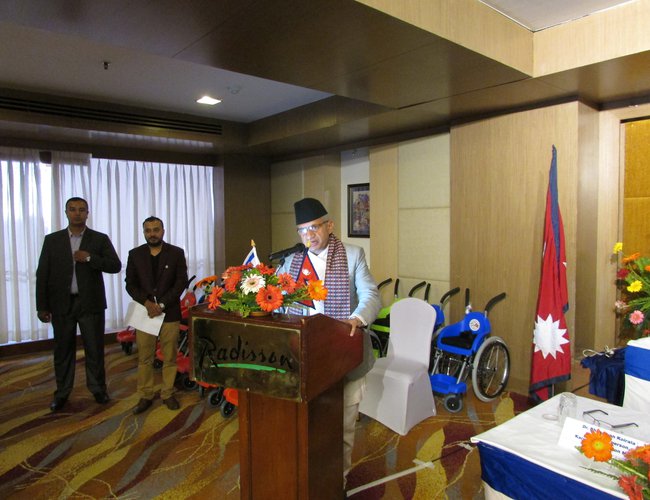
Minister for Foreign Affairs Pradeep Kumar Kyawali said that the Fourth BIMSTEC Summit successfully concluded today.
“As you all know this Summit is the major international event Nepal hosted after the promulgation of the Constitution of Nepal and after the formation of the present Government. We had a little time to prepare all aspects of the Summit. With the cooperation of the people of Nepal, political parties, federal, provincial and local governments, civil servants, security personnel, private sector, media, and civil society, we have been able to successfully conclude it. On behalf of the Government and people of Nepal the Rt. Honorable Prime Minister has extended sincere thanks to all of them for the cooperation and understanding,” said minister Gyawali to a press conference.
He said that the Summit deliberated on the existing status of cooperation and took a number of decisions to move the regional process forward. I understand you have gone through the Summit declaration.
“The Summit reaffirmed its commitment to the principles and purposes of BIMSTEC as enshrined in the 1997 Bangkok Declaration and take forward cooperation on the basis of the principles of sovereign equality, territorial integrity, political independence, non-interference in internal affairs, peaceful co-existence and mutual benefit,” said minister Gyawali.
According to minister, the Summit realized eradication of poverty as the greatest regional challenge to development and expressed commitment to work together for the implementation of the Agenda 2030 for Sustainable Development.
Main Highlights of Minister’s Press Meet
The summit emphasized on multi-dimensional connectivity, trade, and investment as a key enabler to economic integration and a major contributing factor for economic and social development.
The Summit recognized special needs and circumstances of the least developed and land-locked developing countries in the region and underlined the necessity to provide meaningful support to their development process.
The Summit expressed commitment to making BIMSTEC a dynamic, more effective and result-oriented organization.
They resolved to leverage on BIMSTEC’s unique position as a bridge linking South and Southeast Asia, and make it an effective platform to promote peace, prosperity and sustainability.
The Summit called for a fair, just, rule-based, equitable and transparent international order; and reaffirmed its faith in multilateralism with the United Nations at the centre and in the rule-based international trading system.
The Summit deplored terrorism in all its forms and manifestations wherever and by whosoever committed. The leaders called for a comprehensive approach in combating terrorism, including preventing financing of terrorists and terrorist actions, blocking recruitment and cross-border movement of terrorists, and countering misuse of internet for purposes of terrorism and dismantling terrorist safe havens.
The Summit reaffirmed its faith in the principles and purposes of the Charter of the United Nations and pledged to strengthen the multilateral system by reforming its rules, institutions and instruments to make it relevant to the present time.
The Summit reviewed the works and progress of the organization made since the 3rd Summit held in Nay Pyi Taw, Myanmar in 2014.
INSTITUTIONAL REFORM
For the institutional reform, the Summit decided to establish a BIMSTEC Permanent Working Committee (BPWC) to deal with administrative and financial matters of the Secretariat and the BIMSTEC Centres and Entities.
The Summit also decided to prepare a draft of the Charter for the organization, defining a long-term vision and priorities for cooperation. This draft will be considered by the BIMSTEC Permanent Working Committee for its adoption by the Fifth Summit.
The Summit also agreed to develop the Rules of Procedure (RoP) for the BIMSTEC Mechanisms.
The Summit directed to explore the possibility of establishing a BIMSTEC Development Fund (BDF) with voluntary contributions from the Member States.
The Summit agreed to enhance the institutional capacity of the BIMSTEC Secretariat through financial and human resources to enable it to initiate projects and programs. It also agreed to raise the numbers of Directors to seven, one from each Member State, in a staggered manner.
The Summit recognized the need to review, restructure and rationalize the existing areas of cooperation and streamline the activities. The matter will be taken up by the BIMSTEC Permanent Working Committee
Poverty Alleviation
The summit expressed commitment to the eradication of poverty in the Bay of Bengal Region by 2030 in line with the 2030 Agenda for Sustainable Development.
Connectivity
The leaders of the BIMSTEC countries resolved to establish multi-modal transportation linkages and smooth, synchronized and simplified transit facilities through the development, expansion and modernization of highways, railways, waterways, sea routes, airways in the region.
The Summit directed to conclude the BIMSTEC Coastal Shipping Agreement and the BIMSTEC Motor Vehicle Agreement as early as possible.
It also called for early adoption of BIMSTEC Master Plan on Transport Connectivity and assigned the BIMSTEC Transport Connectivity Working Group (BTCWG) to work out the modalities for its implementation.
The Summit decided to establish a Working Group on information and communications technology to provide more affordable and high-speed internet and mobile access to the peoples of the region.
Trade and Investment
The Summit renewed its commitment to an early conclusion of BIMSTEC Free Trade Area (FTA) negotiations.
The leaders expressed satisfaction on the progress of negotiation on the Agreement on Trade in Goods and the Agreement on Customs Cooperation.
The leaders agreed to revitalize the activities of BIMSTEC Business Forum and BIMSTEC Economic Forum.
They also agreed to assign the Expert Group on BIMSTEC Visa Matters to continue negotiation for finalization of the modalities for the BIMSTEC Visa Facilitation.
Counter Terrorism and Transnational Crime
The Summit called upon the Member States for early ratification of Convention on Mutual Legal Assistance in Criminal Matters;
Expressed satisfaction that a large majority of Member States have ratified the BIMSTEC Convention on Cooperation in Combating International Terrorism, Transnational Organized Crime and Illicit Drug Trafficking.
Expressed determination to strengthen cooperation among the law enforcement, intelligence and security agencies; and decide to hold meetings at the level of BIMSTEC Home Ministers as part of promoting cooperation and coordination on counter terrorism and transnational organized crimes.
Environment and Disaster Management
The summit decided to establish an Inter-governmental Expert Group to develop plan of action to improve preparedness and coordination for responding to natural disasters.
Climate Change
The Summit reaffirmed commitments to operationalize the Paris Agreement, in accordance with principle of common but differentiated responsibilities and respective capabilities.
The leaders expressed serious concerns over environmental degradation, adverse impact of climate change and global warming on the fragile Himalayan and mountain eco-systems and their inter-linkages with the Bay of Bengal and Indian Ocean.
Decided to explore the possibility to establish an Inter-governmental Expert Group to develop a plan of action for collective response to climate change for the region.
Energy
The Summit agreed to expedite efforts to develop a comprehensive plan for energy cooperation.
It decided to constitute an inter-governmental group of experts to enhance energy cooperation, including in hydro-power and other sources of renewable energy.
The Summit also welcomed the signing of the Memorandum of Understanding on BIMSTEC Grid Interconnection.
The leaders called for an early operationalization of the BIMSTEC Energy Centre to strengthen energy cooperation in the region.
Technology
The leaders agreed to enhance cooperation in technologies – including for Micro, Small and Medium Enterprises.
Welcomed the progress towards signing of the Memorandum of Association on the Establishment of BIMSTEC Technology Transfer Facility in Sri Lanka.
They also agreed to focus cooperation in human resources development and education for the advancement of technology in the region.
Agriculture
The Summit decided to deepen cooperation in the agricultural and allied sectors, including crops, livestock and horticulture, farm machinery and harvest management.
Agreed to task the authorities to attain food and nutritional security; and preserve and promote knowledge about traditional farming.
Fisheries
The leaders agreed to deepen cooperation in fisheries to ensure food security and assigned relevant national agencies to explore how the landlocked Member States can benefit from inland fisheries.
Public Health
The Summit agreed to expand cooperation to address non-communicable diseases as well as trans-national public health issues such as, HIV and AIDS, malaria, dengue, tuberculosis, viral influenza-including avian and swine influenza and other emerging public health threats;
People-to-People Contacts
The leaders resolved to promote people-to-people contacts at various levels.
Noted the activities of the BIMSTEC Network of Policy Think Tanks (BNPTT) and directed the relevant agencies to finalize the terms of reference (ToR) of BNPTT.
The Summit agreed to explore possibility of establishing appropriate BIMSTEC forums for parliamentarians, universities, academia, research institutes, cultural organizations and media community to expand the scope of people-to-people contacts.
Cultural Cooperation
The Summit underlined the importance of Buddhism as a connecting thread in the region and expressed commitment to giving a clear manifestation to this by establishing a Buddhist Circuit.
The Summit also agreed to hold meetings of BIMSTEC Cultural Ministers and BIMSTEC Cultural Festival at regular intervals.
Tourism
The Summit agreed to take concrete steps to promote intra-BIMSTEC tourism.
The leaders also agreed to assign relevant authorities to devise tourism strategies, and agreed to take concrete measures to facilitate tourism by ensuring safety and security of tourists, and smooth transport connectivity.
The leaders reaffirmed commitment to developing and promoting Buddhist Tourist Circuit, Temple Tourist Circuit, ancient cities trail, eco-tourism and medical tourism;
The Summit welcomed the offer of Nepal to host a BIMSTEC tourism conclave in Nepal in 2020 coinciding with the Visit Nepal Year 2020.
Mountain Economy
The Summit underlined the need of concrete efforts to ensure the conservation of mountain ecosystems, including their bio-diversity in order to support sustainable development.
The leaders welcomed the concept note on promoting mountain economies in BIMSTEC countries developed by Nepal and decided to establish an Inter-governmental Expert Group to develop an action plan.
Blue Economy
The summit agreed to cooperate in Blue Economy sector in the region and decided to establish an Inter-governmental Expert Group to develop an action plan on blue economy, keeping in mind the special needs and circumstances of the landlocked Member States.
Read: BIMSTEC Summit Declaration
- India Supported Construction Of Four Schools In Nuwakot
- Mar 19, 2021
- Nepal Denies Permission For Third Phase Trial Of Vaccine Against COVID-19
- Aug 31, 2020
- Messi Can Only Cancel Barcelona Contract If €700 Million Release Clause Is Paid, La Liga Confirms
- Aug 31, 2020
- India To Carry Out Study On Kathmandu-Raksaul Railway
- Aug 28, 2020
- COVID-19: 1,351 Personal Of Nepal Police Infected
- Aug 28, 2020
















